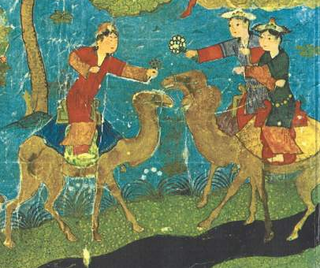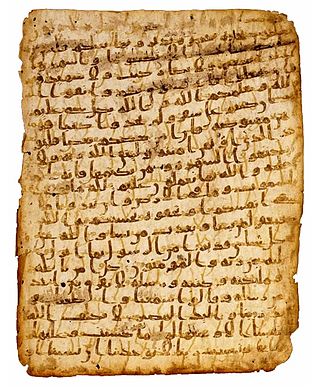Related Research Articles

The Quran, also romanized Qur'an or Koran, is the central religious text of Islam, believed by Muslims to be a revelation directly from God (Allah). It is organized in 114 chapters which consist of individual verses. Besides its religious significance, it is widely regarded as the finest work in Arabic literature, and has significantly influenced the Arabic language. It is also the object of a modern field of academic research known as Quranic studies.

In Islam, a houri is a maiden woman with beautiful eyes who is described as a reward for the faithful Muslim men in paradise.

Noah, also known as Nuh, is recognized in Islam as a prophet and messenger of God. He is also believed to be the first messenger sent by God. He is one of the Ulul 'azm prophets. Noah's mission was to warn his people, who were plunged in idol worshipping. God charged Noah with the duty of preaching to his people, advising them to abandon idolatry and to worship only God, and to live good and pure lives. Although he preached the Message of God with zeal, his people refused to mend their ways, leading to building the Ark and the Deluge, the Great Flood. In Islamic tradition, it is disputed whether the Great Flood was a global or a local one. Noah's preaching and prophethood spanned 950 years according to the Quran, ahadith and tafsir.
Tafsir refers to exegesis, usually of the Quran. An author of a tafsir is a mufassir. A Quranic tafsir attempts to provide elucidation, explanation, interpretation, context or commentary for clear understanding and conviction of God's will in Islam.

Al-Fatiha is the first chapter of the Quran. It consists of seven verses which consist of a prayer for guidance and mercy.
The Pen, or Nūn is the sixty-eighth chapter (sūrah) of the Qur'an with 52 verses (āyāt). Quran 68 describes God's justice and the judgment day. Three notable themes of this Surah are its response to the opponents' objections, warning and admonition to the disbelievers, and exhortation of patience to the Islamic prophet Muhammad. Chronologically, this was the first appearance of any of the "disjointed" [i.e., single] letters (muqattaat) which precede a number of the surahs of the Qur'an, while in Quranic order this is the last surah to have the appearance of muqattaat.
Al-Qaria or The Calamity, is the 101st chapter (sūrah) of the Quran, with 11 āyāt or verses. This chapter takes its name from its first word "qariah", referring to the Quranic view of the end time and eschatology. "Qariah" has been translated as calamity, striking, catastrophe and clatterer. According to Ibn Kathir, a traditionalistic exegete, Al-Qariah is one of the names of the Day of Judgement, like Al-Haaqqa, At-Tammah, As-Sakhkhah and others.

Jāmiʿ al-bayān ʿan taʾwīl āy al-Qurʾān, popularly Tafsīr al-Ṭabarī, is a Sunni tafsir by the Persian scholar Muhammad ibn Jarir al-Tabari (838–923). It immediately won high regard and has retained its importance for scholars to the present day. It is the earliest major running commentary of the Quran to have survived in its original form. Like his history, al-Tabari's tafsir is notable for its comprehensiveness and citation of multiple, often conflicting sources. The book was translated into Persian by a group of scholars from Transoxania on commission of the Samanid king, Mansur I (961–976).
Tafsir al-Qurtubi is a 13th-century work of Qur'an exegesis by the classical scholar Al-Qurtubi. Considered one of the best and most iconic tafsirs to date. The tafsir of Al-Qurtubi is regarded as one of the most compendious exegesis of them all and is truly among the most popular. Tafsir al-Qurtubi is also known as Al-Jami' li Ahkam al-Qur'an as its name suggests.
Muhammad Karam Shah al-Azhari was an Islamic scholar of Hanafi jurisprudence, Sufi, and Muslim leader. He is known for his work Tafsir Zia ul Quran fi Tafsir ul Quran,. It is commonly referred to as Zia ul Quran. He also wrote Zia un Nabi, a biography of Muhammad in seven volumes.
Tafsīr al-Jalālayn is a classical Sunni interpretation (tafsir) of the Quran, composed first by Jalal ad-Din al-Maḥalli in 1459 and then completed after his death by Jalal ad-Din as-Suyuti in 1505, thus its name, which means "Tafsir of the two Jalals". It is recognised as one of the most popular exegeses of the Quran today, due to its simple style and its conciseness—it is only one volume in length.

Islamic holy books are certain religious scriptures that are viewed by Muslims as having valid divine significance, in that they were authored by God (Allah) through a variety of prophets and messengers, including those who predate the Quran. Among the group of religious texts considered to be valid revelations, the three that are mentioned by name in the Quran are the Tawrat, received by prophets and messengers amongst the Children of Israel; the Zabur (Psalms), received by David; and the Injeel, received by Jesus. Additionally, the Quran mentions God's revealing of the Scrolls of Abraham and the Scrolls of Moses.
Al-Burhan fi Tafsir al-Quran or Kitab al-Burhan fi Tafsir al-Quran, popularly known as Tafsir al-Burhan, is a Shi'a Muslim tafsir written by Syed Hashim bin Sulaiman bin Ismail al Husaini al Bahrani.
Ma'ariful Qur'an is an eight-volume tafsir (exegesis) of the Quran written by Islamic scholar Mufti Muhammad Shafi (1897–1976). Originally written in Urdu, it is the most prominent work of its author.

Muhammad Quraish Shihab is an Indonesian Muslim scholar in the sciences of the Qur'an, an author, an Academic Scholar, and former Minister of Religious Affairs in the Fourth Development Cabinet (1998). He is the older brother of the former Coordinating Minister for People's Welfare, Alwi Shihab.
Quranism is an Islamic movement that holds the belief that the Quran is the only valid source of religious belief, guidance, and law in Islam. Quranists believe that the Quran is clear, complete, and that it can be fully understood without recourse to the hadith and sunnah. Therefore, they use the Quran itself to interpret the Quran, an exegetical principle known as tafsir al-Qur'an bi al-Qur'an.
Mohammed Abu Zaid Al Damanhury was a 20th century Quranist scholar and Al-Azhar University graduate from Damanhur, Egypt who wrote a controversial commentary on the Quran.
Tauzeeh Al-Qur'an Asan Tarjuma Quran is a three-volume tafsir (exegesis) of the Quran written by Pakistani Islamic scholar Mufti Taqi Usmani. The book was originally written in Urdu and has been translated into at least two languages, Bengali and Hindi.
References
- ↑ "The Principles Of Shi'i Tafsir And The Relation Between The Imams(a.s) And The Qur'an". Momin.com. 1983-06-16. Archived from the original on 2016-04-24. Retrieved 2014-01-26.
- ↑ "Tahoor Encyclopedia". Tahoordanesh.com. Archived from the original on 2010-11-09. Retrieved 2014-01-26.